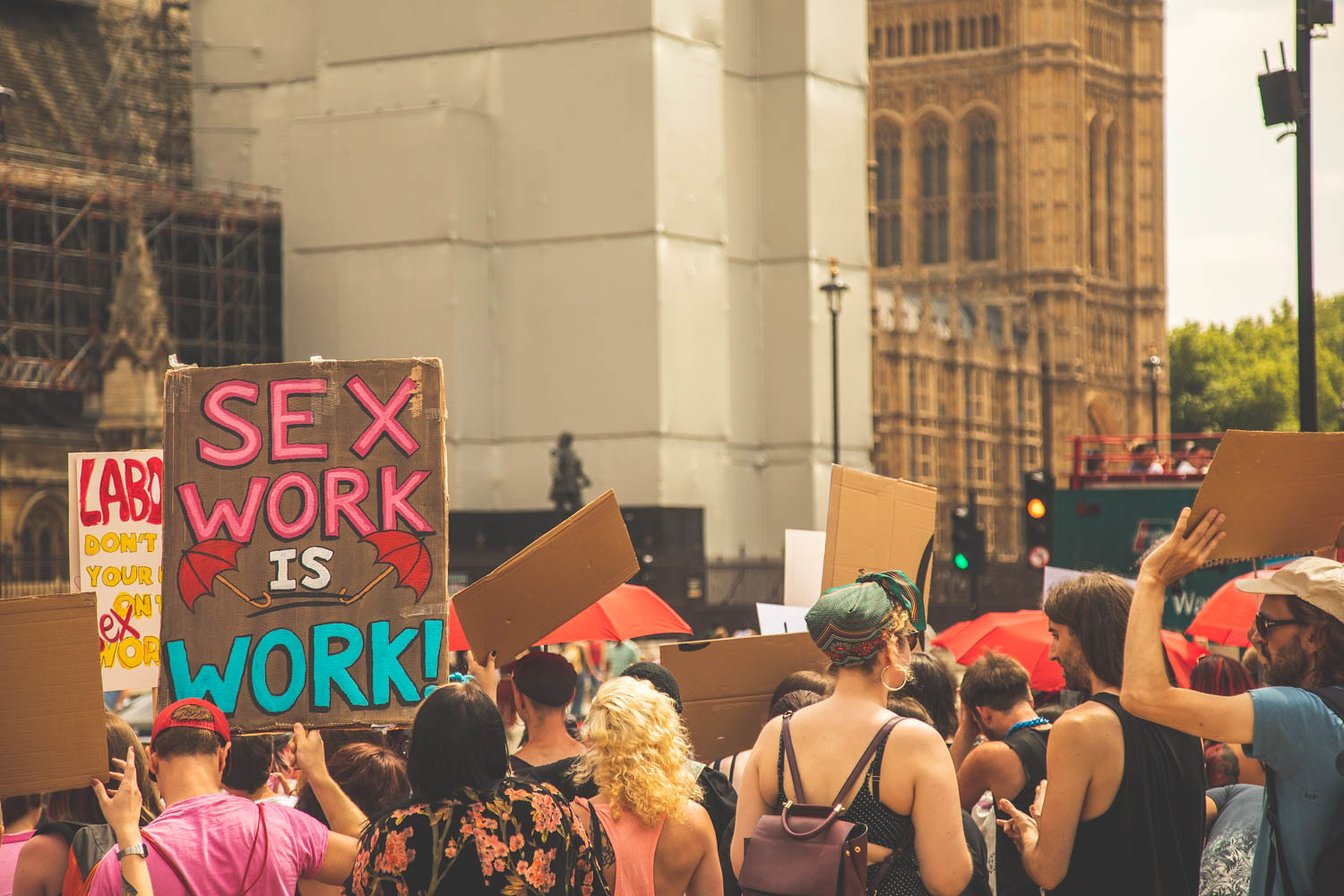Sex work and the law
At present, sex work is partially criminalised in the UK.
It is not illegal to sell sex but organisational aspects of sex work – such as soliciting in a street or public place, or working collectively in a brothel – are punishable offences.
Organisations including Amnesty International, the World Health Organisation, UNAIDS, and the Royal College of Nursing have called for sex work to be fully decriminalised. They argue that criminalisation undermines the rights and safety of sex workers by pushing it underground.
National Policing Sex Work guidance states that “simple enforcement does not produce sustainable outcomes and can actually increase the vulnerability of sex workers to violent attack”.
It adds: “Brothel closures and ‘raids’ create a mistrust of all external agencies including outreach services. It is difficult to rebuild trust and ultimately reduces the amount of intelligence submitted to the police and puts sex workers at greater risk.”
In 2016, the Home Affairs Select Committee recommended that the government fully decriminalise sex workers as the best means of ensuring their safety. However, the Home Office responded by arguing that there is not enough evidence to warrant a change in legislation.
Last year, EachOther commissioned a poll which revealed that more people in the UK support sex work law reform than those who oppose it.
Trafficking: A distinct issue
Speaking to the House of Common’s last week, Dame Johnson said her Bill aims to “bust the business model of sex trafficking” – dampening demand by punishing buyers. “Our continued tolerance of this harmful trade puts vulnerable women and girls at ongoing risk from traffickers and pimps who seek to profit from it,” she added, before reading testimonies of sex trafficking victims.
The MP appears to take the view that all sex work is exploitative. However, the distinction between the sex work and sex trafficking is internationally recognised. “The difference is that the former is consensual, whereas the latter is coercive,” the UN’s Global Commission on HIV and the Law said in 2012. Campaigners have highlighted that the conflation of sex work with modern slavery and trafficking is particularly common when it involves migrant women.
Human trafficking is a horrific human rights violation which must be tackled. It is the use of threats, force, abduction, deception and coercion in order to control people and exploit them.
Meanwhile, sex work is a consensual transaction between adults. As Maria says, it is the only means of survival for some.
Trafficking exists in the sex industry but is not unique to it. In 2018, there were three times as many confirmed victims of labour exploitation (307) – often working in agriculture, garment factories, building companies and car washes – than confirmed cases of sexual exploitation (102) over the same period. Kingston University Prof Nick Mai estimates that between six and 15% of migrant sex workers in the UK have been trafficked.
The right to health
Everyone has the right to the highest attainable standard of health. This is recognised in the constitution of the World Health Organisation, the 1948 Universal Declaration of Human Rights and in the 1966 International Covenant on Economic, Social and Cultural Rights.
The ‘Nordic’ model
We all have a right to health, regardless of what we do for a living. While few would disagree with this idea, the debate on how best to protect this right when it comes to sex work is polarised.
Johnson’s Bill aims to introduce to England and Wales the so-called Nordic model of sex industry regulation, which was first introduced in Sweden in 1999 and is in place in other European countries and Canada.
Reports indicate the policy has reduced people accessing the sex industry, reducing street prostitution in Sweden by half. But academics, including the Sex Work Research Hub, say demand has simply been displaced to other, more dangerous areas.
For instance, research by the Swedish National Bureau of Investigation indicated that, since the introduction of the Swedish sex buyer law, the number of Thai massage parlours in Stockholm had increased from 90 to 250.
Norwegian outreach workers told Amnesty International in 2016 that Thai sex workers had become more reluctant to take condoms after the country adopted the Nordic model in 2009 – fearful that they could be used as evidence if found by police.
In the year after the Nordic Model was introduced in Ireland in 2017, reports of violent attacks on sex workers have increased by almost 50 percent. “People who are doing the worst of the crimes are not deterred at all by this law,” says Kate McGrew, director of the Sex Workers Alliance of Ireland told the New Statesman in 2018. “People see as us even more outside society, as vulnerable, as even less likely to call gardai [police] or draw attention.”
Earlier this year a diverse group of 80 experts called for the law to be repealed, saying that it “places sex workers at odds with the police and the criminal process and risks their health and their safety”.
As it stands, many sex workers have low levels of trust in the police. An October 2020 report by the International Committee on the Rights of Sex Workers in Europe found that 36% of sex workers interviewed did not go to the police at all for fear of deportation and arrest.

A report found that 36% of sex workers interviewed did not go to the police at all for fear of deportation and arrest.
What Is Decriminalisation?
Decriminalisation is where a criminal offence ceases to be treated as such. In 2003, New Zealand fully decriminalised adult sex work, instead regulating the sex industry through occupational health and safety standards.
This approach is not the same as legalisation and regulation, which is used in Germany and the Netherlands among other places. In these countries, the sale of sex is legal in certain settings or circumstances, such as in licensed brothels, often with mandatory registration and HIV and sexually transmitted infection (STI) testing. But it remains a criminal offence outside these settings or where people fail to meet registration requirements.
Ways Forward
In 2018, academics from the London School of Hygiene and Tropical Medicine compared sex work laws from 33 countries around the world to determine which approach best protects sex workers’ safety, health and access to services.
They found that sex workers in countries with repressive policing of the profession were also three times as likely to experience violence and twice as likely to contract HIV or an STI.
“Laws prohibiting sex workers and their clients from soliciting or communicating in public places [which includes the Nordic model] meant that sex workers had to rush screening and negotiations, or conduct them in secluded places, leading to greater risk of violence and theft,” assistant professor Pippa Grenfell wrote for EachOther last year.
The best approach was said to be full decriminalisation – a policy adopted by New Zealand in 2003.
In 2016, the Home Affairs select committee acknowledged the change had “resulted in a number of benefits, including a clear policy message, better conditions for sex workers, improved co-operation between sex workers and the police, and no detectable increase in the size of the sex industry or exploitation of sex workers.”
Earlier this week, a New Zealand sex worker won major compensation following a tribunal against her employer over sexual harassment. Sex work rights campaigners described the case as a “milestone”, showing the power of progressive legislation to protect her rights as a worker.
Organisations including Amnesty International, the World Health Organisation, UNAIDS, and the Royal College of Nursing have called for sex work to be fully decriminalised. They argue that criminalisation undermines the rights and safety of sex workers by pushing it underground.
Meanwhile, tackling exploitation in the UK sex industry, among other sectors, will involve broader reforms to reduce poverty and increase trust between authorities and vulnerable people.
It means lifting people out of poverty and destitution – through initiatives such as the Real Living Wage, and making the welfare system more compassionate. However, the situation for sex workers has only worsened during the pandemic. Sex workers were not entitled to Covid job support schemes, as they lack official worker status. It has fallen to groups such the Sex Worker Advocacy and Resistance Movement (Swarm) and Umbrella Lane to plug the gap – issuing grants to enable more than 1,200 sex workers to pay for essentials such as food and rent.
We are disappointed that our local MP has put forward a proposal to change the law, which has not been shaped in consultation with the women most likely to understand or suffer from its effects, before we have had a chance to discuss it with her.
An Untold Story – Voices, a collective of women with experience of sex work in Hull
It also means reforming hostile environment immigration policies which have made trafficking victims fearful of authorities – despite the introduction of modern slavery legislation – as they believe the Home Office wants to remove, deport and detain them. Even in New Zealand, migrants are still left out of the rights afforded to sex workers. Studies have shown that the discrimination still leads to threats of deportation, creating conditions ripe for exploitation and trafficking.

Sex workers demonstrate outside a Parliament in London on the 4th July 2018. Credit: Juno Mac / Flickr
It also vital we listen to sex workers themselves – who have unionised and are calling for their profession to be recognised as work. Responding to Johnson’s Bill, An Untold Story – Voices, a campaign group of women with lived experience of sex work in the MP’s Hull constituency, said: “We are disappointed that our local MP has put forward a proposal to change the law, which has not been shaped in consultation with the women most likely to understand or suffer from its effects, before we have had a chance to discuss it with her.”
To protect sex workers rights, their voices must be heard and listened to.
The views expressed in this article are those of the author and do not necessarily reflect the views of EachOther. Rachel Trafford is a content writer for the Immigration Advice Service, an immigration law firm that works with both individuals and businesses across the UK and overseas.
Why The Sexual Exploitation Bill Will Make Vulnerable Women Less Safe

